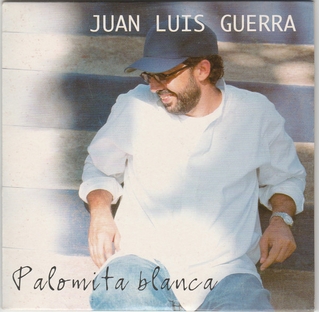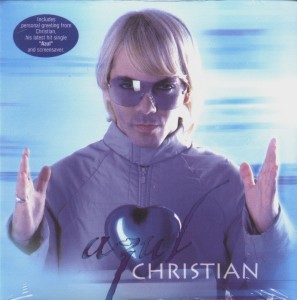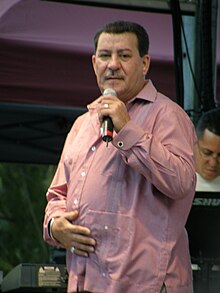
"I Need to Know" is a song by American singer Marc Anthony for his eponymous fourth studio album. It was released as the lead single from the album on August 16, 1999. Written and produced by Anthony and Cory Rooney, "I Need to Know" is a song about a man who longs to know how a woman feels about him. The song blends the musical styles of several genres, including R&B and Latin music; the instruments used include synthesized violin and piano sounds, timbales and congas. Anthony recorded a Spanish-language version of the song, translated by Angie Chirino and Robert Blades, titled "Dímelo".
The Tropical Airplay chart is a record chart published by Billboard magazine introduced in 1994. The first number-one song on the chart was "Quien Eres Tu" by Luis Enrique. Originally, rankings on the chart were determined by the amount of airplay a song received on radio stations that primarily played tropical music, namely music originating from the Spanish-speaking areas of the Caribbean such as salsa, merengue, bachata, cumbia, vallenato, and tropical fusions. Any song, regardless of its genre, was eligible for the chart if it received enough airplay from the panel of tropical music radio stations being monitored.

"Mi PC" is a song by Dominican Republic singer-songwriter Juan Luis Guerra and his band 4-40 from his eighth studio album, Ni Es lo Mismo Ni Es Igual (1998). The song was released as the lead single from the album in November 1998 by Karen Records. The song was written and produced by Guerra. It is a pop merengue track in which Guerra uses computer terminology to narrate a love story. "Mi PC" was met with positive reactions from music critics who found the lyrics to be clever and its music catchy.

"Palomita Blanca" is a song by Dominican Republic singer-songwriter Juan Luis Guerra and his band 4-40 from his eighth studio album, Ni Es lo Mismo Ni Es Igual (1998). As with the rest of the album, the song was written and produced by Guerra. The song was released as the second single from the album in March 1999 by Karen Records. It is a bachata acoustic ballad about a man who is immensely in love with a woman and refuses to let her go.

Una Navidad con Gilberto, is the title of a Christmas album released by Puerto-Rican singer Gilberto Santa Rosa on October 14, 2008, by Sony BMG Norte. It was the first time that Gilberto released his own Christmas album. He previous collaborated with various artists on the Tarjeta de Navidad by Sony Discos. In addition, he collaborated with Puerto Rican salsa group El Gran Combo de Puerto Rico on their album, Asi es Nuestra Navidad. The album peaked at number-six in the Billboard Top Latin Albums chart and number twenty-two on the Billboard Holiday Albums chart. It remained on the Top Latin Album charts for thirteen weeks. The album reached number-one on the Tropical Albums where it spent three weeks on the spot. At the Latin Grammy Awards of 2009, the album received a Latin Grammy Award for "Best Traditional Tropical Album".

"Azul" (transl. "Blue") is a song by Mexican singer Cristian Castro from his seventh studio album of the same name (2001). The song was co-written by brothers Kike and Gustavo Santander and produced by Kike, Andrés Munera, Fernando "Toby" Tobón. It is a pop rock power ballad in which the singer compares love to the color blue. The track was released on as the lead single from the album by BMG US Latin on 3 May 2001. A music video for "Azul" was directed by Pedro Torres and features Castro in a beach, house, and a nightclub with friends and premiered on 6 June 2001.
"Hay Que Poner el Alma" is a song written by Omar Alfanno and performed by Puerto Rican singer Víctor Manuelle on his 1996 self-titled studio album and was released as the lead single from the album. It became his first number song on the Tropical Airplay where it spent six weeks on this position and was the second best-performing tropical song of 1996. José A.Estévez, Jr. of AllMusic listed the song as one of the album's highlights. "Hay Que Poner el Alma" won "Tropical Song of the Year" at the 1997 SESAC Latin Music Awards which was presented to Alfanno.
"Tú Cómo Estás" is a song written by Gustavo Márquez and performed by Domingo Quiñones on his studio album Mi Meta (1996). In the song, the artist wonders how his former love is doing and if she misses him. It became his first and only number one song on the Tropical Airplay in the US where it spent two weeks on top. José A.Estévez, Jr. of AllMusic called it "among the singer's finest moments" and praised the arrangement by Ramón Sánchez. It was recognized as recognized as one of the best-performing songs of the year at the 1997 ASCAP Latin Awards on the tropical field.
"Esperaré a Que Te Decidas" is a song written by Mary Lauret and performed by Puerto Rican salsa singer Tony Vega on his studio album on his 1996 self-titled studio album and was released as the lead single from the album. It became his first and only number one song on the Tropical Airplay chart. It was recognized as recognized as one of the best-performing songs of the year at the 1997 ASCAP Latin Awards on the tropical field.

"Dile a Ella" is a song written by Gil Francisco and performed by Puerto Rican salsa singer Víctor Manuelle on his fourth studio album A Pesar de Todo (1997). It was released as the lead single from the album. In the song, the singer asks his friend to tell a woman that he loved that he cannot forget her. It became his third #1 hit on the Tropical Airplay chart and spent nine weeks week on top, making it the longest-running tropical song of 1997. José A. Estévez, Jr. called it a tune that "bristles with uninhibited energy". Paul Verna of Billboard cited the song as one of the album's "amorous ditties". "Dile a Ella" was also listed on Billboard's "Best 15 Salsa Songs Ever". "Dile a Ella" won a BMI Latin Award in 1999.
"Que Habría Sido de Mí" is a song written by Omar Alfanno and performed by Puerto Rican singer Víctor Manuelle on his fifth studio album, Ironías(1998), and was released as the second single from the album. It became his seventh number song on the Tropical Airplay chart. AllMusic critic José A.Estévez, Jr. cited it as one of the songs from where the album where Ramón Sánchez's arrangements allows Manuelle to "drive the best of the talented improviser, belting it out with all his might". This sentiment was shared by Billboard editor John Lannert who called it one of the album's "well-crafted tracks". Parry Gettelman praised the performance of both the bassist and the pianist in the track. On the former, she noted that Ruben Rodriguez "provides a graceful bass line that subtly builds tension released in the soaring chorus". It was nominated "Tropical/Salsa Hot Track of the Year" at the 1999 Latin Billboard Music Awards, but lost to "Suavemente" by Elvis Crespo. In 2000, it was recognized as one of the best-performing songs of the year at the American Society of Composers, Authors and Publishers Awards under the salsa category.

"Pero Dile" is a song written and performed by American singer Víctor Manuelle on his sixth studio album, Inconfundible (1999). It was released as the album's lead single in 1999 by Sony Discos. The song's production was handled by Sergio George while its arrangements was done by Ramón Sanchez. "Pero Dile" is one of the album's salsa songs; it narrates the singer telling his ex to tell other people that he was a bad lover and admits to being at fault. "Pero Dile" was nominated in the category of Tropical/Salsa Hot Latin Track of the Year at the 2000 Billboard Latin Music Awards and was a recipient of the American Society of Composers, Authors and Publishers (ASCAP) Latin Award in 2000. Commercially, it reached number three on the Billboard Hot Latin Songs and topped the Tropical Airplay chart in the United States, where it spent 11 weeks at number one.










